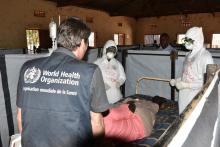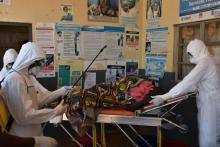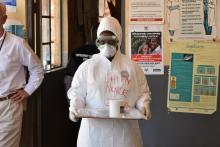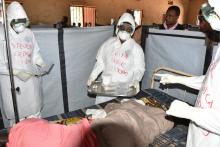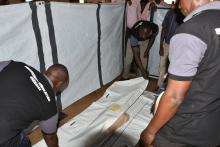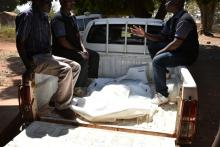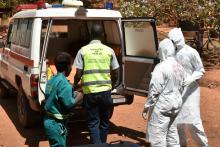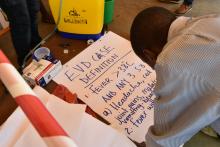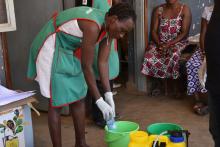WHO and Ministry of Health in simulation exercise to strengthen disease outbreak preparedness and response
Disease outbreaks have hit many countries, world over, with millions of lives lost and a lot of women and children left suffering. Outbreaks are very unpredictable and what begins as a rumor or isolated confirmed case can multiply leading to many cases and deaths.
In 2014, the world grappled with the Ebola outbreak in Guinea, Liberia, Nigeria and Sierra Leone. The outbreak led to loss of over 10,000 lives, and tested the capacity and readiness of affected countries’ Health System to respond to outbreaks leaving a number of lessons for the World Health Organization (WHO) and partners.
As of April 2016, the total cumulative 28,652 cases (suspected, probable, and confirmed) and 11,325 deaths (CFR 39.5%) had been reported. This Ebola outbreak was the largest in recorded history in terms of the number of cases and deaths as well as geographical spread. WHO provided technical assistance through the deployment of over 150 multidisciplinary team of experts involved in a range of outbreak response activities such as surveillance, case management, communication and social mobilization, infection control, logistics, and data management.
The WHO Regional Director for Africa at that time, Dr. Luis Sambo said, “This is no longer a country specific outbreak but a sub-regional crisis that requires firm action by Governments and partners. There is an urgent need to intensify response efforts; to promote cross-border collaboration and information sharing of suspected cases and contacts in line with WHO guidelines and to mobilize all sectors of the community to ensure unhindered access to affected areas.”
Africa has faced other disease outbreaks such as Yellow Fever in Angola and the Democratic Republic of Congo, and Cholera in South Sudan, Ethiopia, Uganda and Tanzania
Therefore, experience from these outbreaks led WHO to design a new and robust approach to increase preparedness for any future outbreaks. WHO now has an emergency roster of WHO staff and non-staff who can be deployed anywhere in world with 48 hours to respond to any disease outbreak or public health event of international concern.
Uganda is recognized and has been rewarded for its immense support to different countries during outbreaks especially during Ebola outbreaks. Uganda built its rich experience from previous outbreaks of Ebola, Marburg, Meningitis Yellow Fever and others that created a tested and committed cadre of health workers in all response pillars of an outbreak. These health workers have been deployed to different countries and have been very instrumental in containing outbreaks.
Uganda remains vulnerable to disease outbreaks which pose serious public health threats to citizens. In the recent past, the country has experienced an unprecedented number of outbreaks including Rift Valley Fever outbreak in Kabale; Yellow Fever in Rukungiri, Masaka, and Kalangala; Cholera in a number of districts; and Malaria in northern Uganda. These epidemics cost lives of Ugandans, and drain the resources meant to improve the quality of life in the country.
The National Multi-hazard Preparedness and Response Plan requires the Ministry of Health and partners to comprehensively address Uganda’s emergency preparedness and response portfolio with emphasis on the ‘very high’ and ‘high’ risk outbreaks. Implementation of this plan will help identify and address the gaps and accelerate Uganda’s progress towards achieving the International Health Regulations (2005) core capacities and make the country safer and secure.
As part of the implementation of the National Multi-hazard Preparedness and Response Plan, WHO supported the training of trainers of rapid response teams in September 2016. These trainers subsequently led the training of a National Rapid Response Team (NRRT) that took place in Jinja on October 2016. As a follow up of the training, the, Ministry of Health conducted a Rapid Response Team simulation exercise at Zirobwe Health Centre III located in rural Luwero district in January 2017. The purpose of the exercise was to assess the operational readiness of the NRRT to respond to disease outbreaks. The simulation involved social mobilization experts, laboratory technicians, clinicians, ambulance technicians, epidemiologists and logisticians.
A replica of an Ebola Treatment Unit (ETU) was set up and health workers went through the steps of responding to a viral hemorrhagic fever outbreak. They covered coordination and communication, contact tracing, social mobilization, laboratory investigation and sample transportation, isolation and transportation of the patient, treatment and safe burial.
The simulation exercise kicked off with the Ministry of Health Public Health Emergency Operations Centre summoning and briefing the NRRT on an alert of a suspected Ebola Virus Disease (EVD) outbreak received from the District Health Officer, Luwero District.
The simulation exercise was closely monitored by WHO and Ministry of Health outbreak response experts to give guidance and ensure that the right steps are followed. The simulation exercise contributed to the reinforcement of response capacities at the National and District level by testing the interactions and complementarities within the national health system. According to the ‘hot wash’ (immediate exercise evaluation), the, Luwero is ready to respond to disease outbreaks and the health workers would respond timely and effectively. However the importance of ‘personal protection’, for the health workers was emphasized to ensure that no life of a health worker is lost in the response as was the case in previous outbreaks.
The health workers at Zirobwe Health Center III were grateful for the drill and thanked WHO and MOH for the training. They further said that the training had beefed up their skills to respond to health emergencies and requested for follow up drills, adding that this would help to even better prepare them for disease outbreak response.
For WHO, the importance of outbreak response readiness cannot be stressed enough. This is key on the organization’s mandate of ensuring that no life is unnecessarily lost to a disease outbreak.

